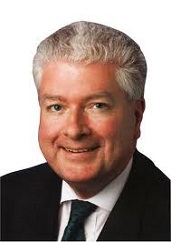Tuesday 10 February 2015
Former MP and shadow pensions minister Nigel Waterson (OL67) entertained his audience at the OGC London branch meeting with stories of Leeds in the 1950s and his life in Parliament, before delving into the consequences of an aging society.
Nigel, who is chairman for NOW: Pensions and The Equity Release Council, recalled that schools were different when he was a pupil. However, he remarked that while board rubbers whizzing past heads and the 11+ have disappeared, some things never change: attempts to keep the boys and girls separate failed even then. Although LGS and LGHS had different finishing times, the boys would simply hang around the bus stops waiting for the ‘greenflies’ (so called because of the girls’ green uniforms) to show up, he said.
Nigel remembered his time at school fondly – apart from his distaste for mandatory rugby and cricket – saying: “Life seemed so much simpler in those days. The Grammar School was a great school and I don’t think I could have had a better education.”
He went on to join the Young Conservatives in Leeds, explaining to his audience: “I don’t think there was ever much of a chance of me not being a Conservative. My parents used to get the Daily Express, for goodness sake! And I think if you’re interested in political life, you choose your side fairly early on, you put your head down and you go for the touch line.”
After attending Queen’s College Oxford, Nigel became a lawyer before being elected an MP in 1992. He spent around 20 years in Parliament, acting as principal private secretary (PPS) to the health minister and to Michael Heseltine, the then deputy prime minister, as well as working in the Whip’s office.
He likened his time in John Major’s government to being in the trenches because of the numerous defections, saying: “Unless you were there, you couldn’t really tell anyone what it was like. It was absolutely ghastly, it was a horrendous time.”
However, the crux of Nigel’s talk was the effects living longer were having on society. He told his audience that when the basic pension was introduced in 1948, a man reaching 65 could be expected to live for another 12 years and a woman for another 15; now the equivalent numbers are 21 and 24 years.
One third of all babies born today will live to be 100, and by 2050 the proportion of over-65s will have increased from 16 per cent to nearly 25 per cent of the population.
Nigel explained how these increases were likely to have a huge effect on society: in particular there will be a need for more carers, state pension ages will have to rise, and innovation will suffer.
He said: “It is often young people who are risk takers, who start businesses, who win Nobel prizes, who invent things. Older people are more cautious and less willing to take risks.”
Nigel finished his speech by warning the audience to plan ahead. While we’re all going to live much longer into retirement, he said, many underestimate their lifespan by several years. To cope with living longer, people will have to start preparing for old age at a much younger age.
The next OGC meeting will be held at Lady Solti’s house in North London when OG Maureen Smith, Professor of Violin at the Royal Academy of Music, will give a talk about her family, entitled Three Generations of Music.






